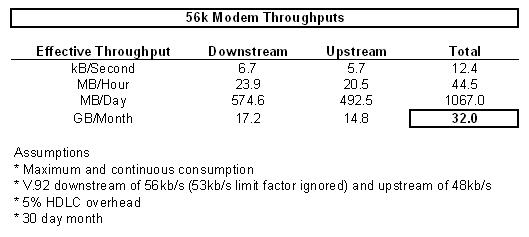Talking Points
One of the grand mysteries of the entire “broadband can no longer be unlimited” argument is the incredible range of usage caps cable operators and telephone companies suggest are required to keep them from going the way of the U.S. auto industry. Broadband providers doing capping will swear that their cap model is the only one that is “fair” and “protects consumers” and “allows us to make required upgrades.” Once those arguments are recited in a unified chorus, corporate spokesfolks zig zag their way all over the place explaining why their 5/40/150/250GB cap is fairest of them all, while trying to ignore those providers who are quite happy and profitable with no cap at all. The customer is the last person they ask, because they know the answer from most will be, “no cap at all.”
This bring several questions to the table:
- Can you provide us with the raw data that illustrates there is a major problem with the current unlimited broadband model and that it cannot sustain profitability except with usage caps?
- Can we obtain independent analysis of that data by a third party and/or put together a conference of business, public, and educational groups to consider new possibilities to deal with what is rapidly becoming a utility-type service?
The answers to those questions have been, by all major industry players, an emphatic “no.” You are required to take their word there is a problem and their solution is the only one that works. And, for that matter, take their word they have an infallible way to measure and bill for usage under a consumption based model. You can independently verify your usage all you want, as long as you pay the bill they send you with their own usage measurement.
It’s not that we’ve been the only ones asking. Broadband Reports has the same questions we do, and asked for the hard data to prove that flat-rate pricing is simply untenable going forward. And here was their response:
“We’ve shared our analysis of our data. We’re not going to share raw data…just not going to happen.”
Okay then, I guess that settles that!
That provokes us to first ponder whether there actually -is- a crisis in the flat rate broadband industry at all? A press release or a claim by a company official isn’t evidence of anything.
Assuming we will never get a satisfactory answer to that question, how about these:
- Why can a company like Time Warner be unable to survive with flat rate pricing in Rochester, Austin, San Antonio, and Beaumont, but can deliver faster speeds with no cap in cities where they face strong competition from uncapped providers?
- If the company was interested in an honest assessment of marketplace reaction to usage caps, why not test in communities with the most robust and challenging competition?
- Why should customers not be deeply offended for being involuntarily turned into guinea pigs and be expected to pay more for a dramatically reduced level of service?
- Why is the nation’s largest cable operator Comcast able to deliver service with a 250GB limit at their current pricing, Verizon FIOS is able to deliver a product line twice as fast as Time Warner with no usage cap at all, and the nation’s second largest cable operator Time Warner needs consumers choosing a meager 20GB tier to not only pay $10/month more than their current unlimited service, but also pay a penalty of $1 for every extra GB?
That old axiom about pricing what the market will bear comes to mind, particularly considering the fact Time Warner is only interested in “gathering facts” from cities where the competition is limited.
The fact the Internet of the last few years is becoming an increasing threat to the video side of the cable industry may also have something to do with it. That will be the subject of an upcoming Talking Point.


 Subscribe
Subscribe
